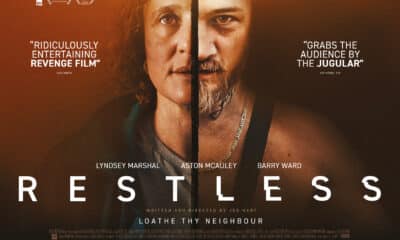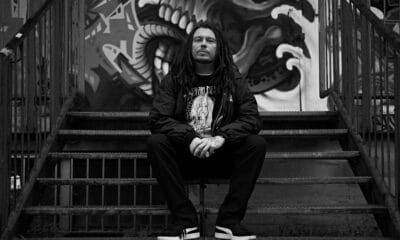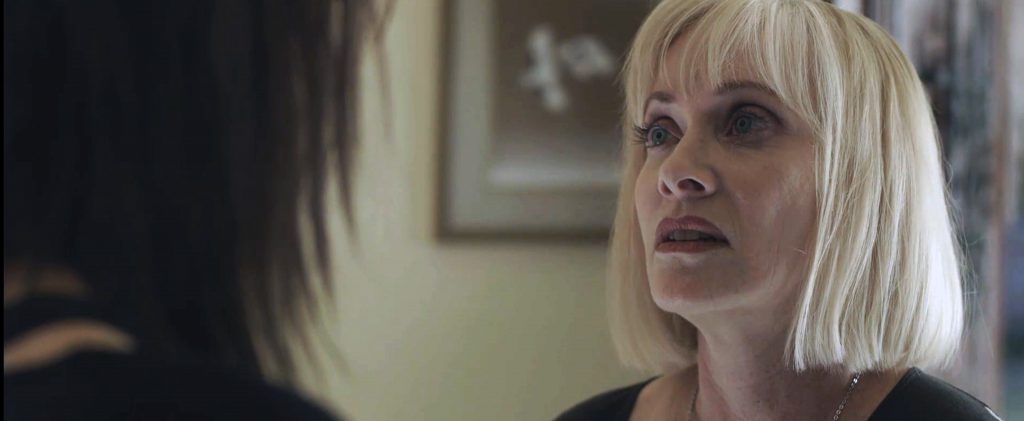
Image courtesy of Clout Communications.
The first weekend Saturday in November saw everyone’s favourite genre team host their annual all-day scare-a-thon. The event, which was held at Cineworld’s Leicester Square, screened six of the newest offerings on the genre scene. In fact the first film, Reborn, was so new, it had literally just come out of the edit mere hours before its debut as the opening film.
Directed by Julian Richards, Reborn tells the story of Tess (Kayleigh Gilbert), a teenage girl who sets out on a mission to find her birth mother (played by Barbara Crampton). On paper that doesn’t sound very scary so we should add that Tess was a still-birth brought back-to-life during an electrical storm. She’s spent the entirety of her sixteen years in the captivity of the morgue worker whom discovered her. Mistreated by him, and armed with an unforeseen side effect of her resurrection, electrokinesis (she can control electricity with her mind), Tess struggles to fit in with the world around her and connect with the parent whom thought her dead years ago.
Julian Richards was originally intended to attend the Frightfest event, but due to a combination of young children and overworking, unfortunately fell sick and was unable to make an appearance. Thankfully, he was up for a phone call and we sat down to pick his brains about everything Reborn.
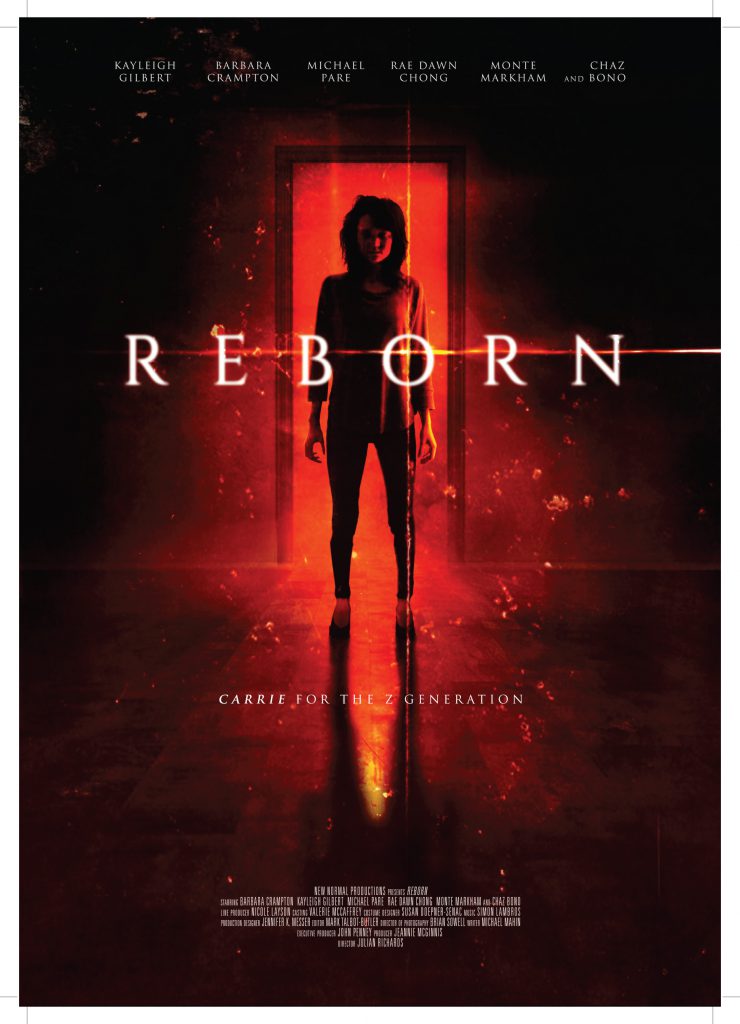
Image courtesy of Clout Communications.
How did the story for Reborn come about and how did you get involved?
With Reborn I was approached whilst in Cannes by producer John Penney and filmmaker Brian Yuzna, who had this project, Reborn, and they were looking for a director. They came to me because when I’m not directing I work as a sales agent selling genre films worldwide. So I’m always in Cannes, Berlin and the American Film Market. They came to me because they thought I might know some new directors for them to consider. I was actually looking to get back into directing, so I volunteered myself. They sent me the script which I read and really liked. I pitched for it the next day and got the job.
What I liked about it was that it was such a classic story, which reminded me of some of the early horror films that got me into the genre in the first place, like Frankenstein. A sort of monster comes to meet it’s maker. But also the mother-daughter relationship there too. I suppose because I’d recently become a parent, that aspect of it was also appealing.
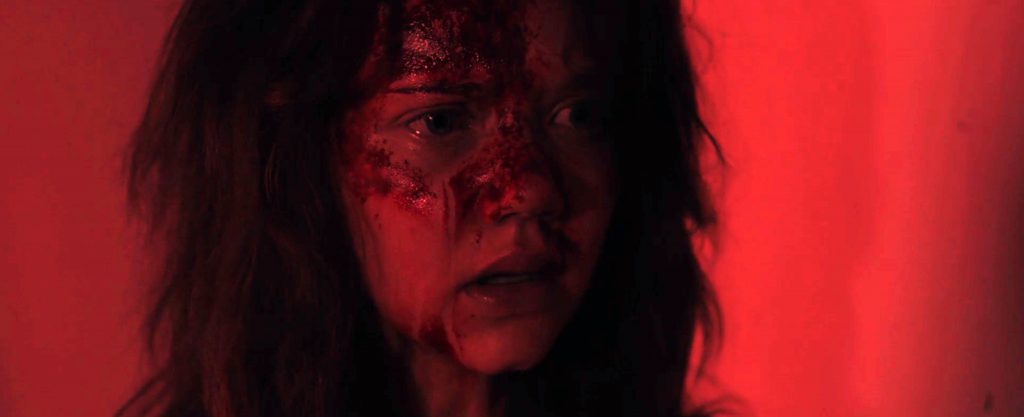
Image courtesy of Clout Communications.
The film deals with some troubling topics, did you have any concerns or reservations?
Not really, no. I had no concerns or reservations about Reborn. I felt that a good aspect of horror is embracing the mutant as Stephen King goes on about in his books of horror. I suppose that also relates to Carrie, which the film shares a lot of themes and ideas with. For me, it was about somebody who is different and misunderstood. Life has dealt her a bad deal and she’s out to find love, to find her mother. It’s a tragedy because she does, but at the same time she’s damaged goods and unable to fulfil what she sets out to achieve. I just found all those elements engaging in the context of making a good horror film. I see it as a classic kind of horror film, I’d never done anything like that before and really wanted to give it a go.
Watching Reborn as a viewer I saw elements of Carrie and Frankenstein. Were there any films or literary texts in particular that you looked to for inspiration?
There were a few other films which inspired some visuals and ideas. The opening scene in the morgue I was thinking of Nacho Cerdà’s short film Aftermath. Then when Tess walks down the stairs at the end, for some reason – I think it was a combination of the location and the kind of mood and atmosphere – it felt very Edgar Allan Poe for me. It was like a Vincent Price, Roger Corman AIP [American International Pictures] vibe, Fall of the House of Usher, that was sort of what I was thinking with the colour tone of that scene.
There’s a lot of meta horror in the film which was something I brought to it. When the script came to me I did a revision of it where I added some bits to it. One of the big revisions that I made was the ending. I realised the protagonist is Lena, it’s not Tess. Lena is out to revive her career, she wants to get the Peter Bogdanovich film. So I felt that was how the film should end, that she gets the film. At the same time I like the idea that when you reveal that you also allude to the possibility that the film you’ve just watched is the film that she’s acted in. It blurs the line between fiction and reality in a way. That was something that distanced it from Carrie whilst also using the Carrie ending to get you to that point. It’s both nostalgic and a homage on one level, but on another it also serves narrative purpose to identity the protagonist. She’s the one that has this objective, she’s confronting all these obstacles along the way but finally gets what she’s after.
There were several other films that influenced scenes in Reborn, and as Reborn via Carrie has a sense of nostalgia, as well as being meta, I thought it would be fun to tip my hat to various films from the 80’s including Scanners, Psycho, Omen II and Christine.

Image courtesy of Clout Communications.
Barbara Crampton is an icon of horror, one who in recent years seems to be championing indie horror. How did she become involved?
When I read the script, because I as a sales agent am selling two of Barbara’s films – Beyond the Gates and Replace – so I’d met Barbara quite recently. She was the first actress that sprung to mind, I thought she’s be perfect for the role. The way the project developed, there was already an actress sort of attached to the project when we started shooting so I went along with that. I was thinking Barbara would be such a good choice, but this other actress was the way it was going to go. But five days into the shoot we got closed down by the LA fires. We basically stopped shooting for four days and that gave me a chance to stop and think. I realised that it wasn’t working and maybe because of the actress we’d originally cast. We made the big decision to replace her with Barbara and re-shoot the first week. So even though the fires closed us down, it gave us a chance to stop and start again. Reborn would not be what it is now if it wasn’t for that mishap that became an excellent opportunity.
I guess that answers my next question – did Barbara and Kayleigh [Gilbert] have much time to rehearse together ahead of filming. They both give great performances, Barbara’s being particularly emotive, and they work so well together. It sounds like if Barbara was added so late in the day, that they didn’t have a great deal of time before cameras rolled.
Yeah. I think that for me the most important process in directing is getting the script right and getting the casting right, Once you’ve got those elements in place, that’s seventy percent of the job done. One thing that we didn’t have the first time around was that chemistry. When Barbara joined the production, she only had two days from the point that she knew that she was going to play Lena to actually playing Lena. It was quite frightening for her to jump into the middle of a production. She’s so experienced and confident and was able to do it.
The thing about Kayleigh is that she’s a new actress with not that much experience, but she’s incredibly talented. I think the script offered both characters a lot to work with. That material was there in the script and both Barbara and Kayleigh were able to work very well with it, and good with each other. It was that ability to play off of each other and make it work that was crucial to the success of the film.

Image courtesy of Clout Communications.
As you mentioned, Kayleigh is a relative newcomer to the industry, what was is about her that made you know she was the one?
Originally, my concern was that she was too tall for the part. Especially when you think of Barbara being the mother. i was always thinking ‘well the daughter’s got to look a little bit like the mother’ so there were physical concerns that I had. I was looking at another actress to play Tess, but it was just Kayleigh’s power in the audition that she did. She basically did such a superb audition for the film, which I recorded and when I got and watched them all I realised, and took advice from a few other people as well, and generally everybody thought that, despite the fact that Kayleigh was so much bigger than which ever actress was going to play the mother, that she was such a powerful actress that you couldn’t not cast her. She really did deliver with the audition. Then when we were working on the film, when we were shooting, she had such a unique approach in a way. She had a coach with her which I’ve never seen before. She kept herself away from the actual chaos of the shoot and just focused on the text and subtext. Then she would turn up and perform. She was able to get her performance in one or two takes. There were no problems with her not remembering lines or completely going off piste with the material. Occasionally I would have to step in and say ‘a little more / a little less’, but generally she was spot on. Only recently I was going through the film searching for frame grabs I could use as publicity stills and I noticed every time I got a picture of Kayleigh she had a different facial expression. She was emoting a different emotion. The range she has is quite impressive.
She’s almost a Tim Burton character come to life aesthetically.
I noticed that in your review, and that’s exactly what I felt. There is something about Kayleigh’s appearance, her big hair and the fact that she’s so thin, she’s almost like a cartoon character. A cross between Edward Scissorhands and Beetljuice‘s Lydia. It’s definitely something that I didn’t intend for, but I noticed it whilst we were shooting and just thought ‘that’s interesting and adds a nice quality to the film.’

Image courtesy of Clout Communications.
I also enjoyed all of the movie posters in Lena’s house, in particular Return of the Living Dead 3, where did they all come from?
[Laughs] Well this is all part of the meta aspect of the film. When we were looking for locations it was very difficult for us to find a house that gave what we wanted. Somewhere we could film for ten days and completely take over the house. Because Brian Yuzna was sort of linked with the production, and John Penney is such a good friend of Brian’s, he managed to get Brian’s permission for us to film in Brian’s house. So all those posters are in Brian’s house. That’s exactly how Brian’s house is. We filmed in Brian’s house. When we saw the location, we thought of Lena’s past and the kind of films that she might have acted in. We just thought ‘this is ready dressed, we don’t need to change anything’. That’s a curious aspect of the film because Barbara Crampton has acted in previous Brian Yuzna productions. It just all seemed to fit in, in an extraordinary way.
That poster’s inclusion definitely made this fan-girl happy.
Well we did find ourselves in some extraordinary situations in the house. When Peter Bogdanovich came over to do his scene, there we were in Brian Yuzna’s house, with Barbara Crampton, Peter Bogdanovich and neighbour turned up for an hour who happened to be Ron Jeremy (Laughs). You certainly realised that you were shooting in Hollywood, and having the Hollywood experience.
You’ve had a busy year, Reborn coming right after Daddy’s Girl, how has it been juggling two projects?
Insane (chuckles). It was just one of those things where two projects came along at the same time. Normally you’d have to turn one down and do the other, but because I hadn’t directed in five or six years I just thought I have to make this work. I started off shooting Daddy’s Girl in October, so I was in Georgia September / October doing Daddy’s Girl. Then I went to the American Film Market in November, and stayed after the market to start prep on Reborn. We shot that in December and early January. Then both films were edited together in Los Angeles so it’s kept me extremely busy. It’s probably contributed to the reason I couldn’t attend the premiere because I obviously eventually became ill from too much work.
2018 has also been a busy year for horror, both indie and mainstream, do you have any favourites that have stood out?
This year I suppose the film, if you can call it horror – probably not – but it’s a disturbing film – was Climax. I sort of rate a film by whether it motivates me to talk to other people about it and say ‘hey you have to see this film,’ and that’s the film that really did impress me. In terms of more obvious horror – A Quiet Place. That was very effective, it was extraordinary. A Quiet Place and Climax would be the two I would rate very highly.
On the independent scene, films that I’ve seen at festivals…what has impressed me? There’s a Brazilian film by Dennison Ramalho called The Nightshifter. It’s very good. I think foreign language films always struggle to find distribution in the UK. There’s not very many distributors that will do them, but Nightshifter is strong enough to find some kind of deal here I’m sure.
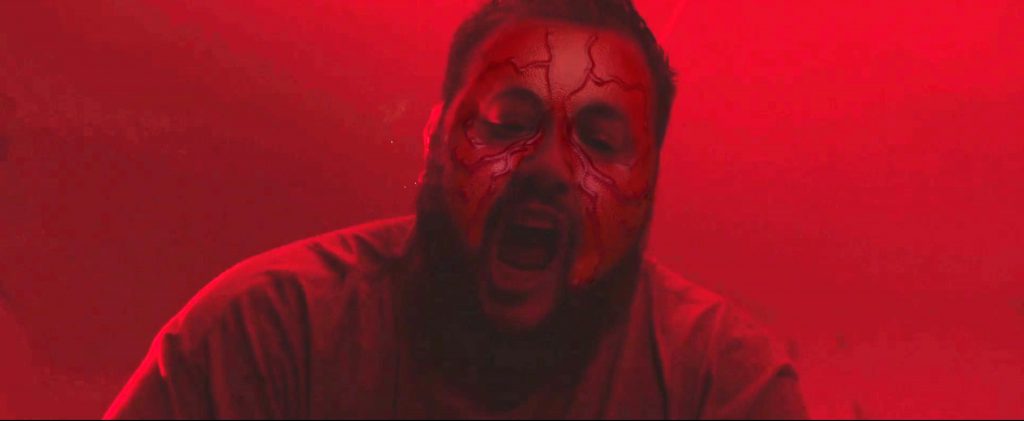
Image courtesy of Clout Communications.
Reborn debuted at Frightfest Halloweeen, what has the reaction been?
It was interesting. We were really fighting to against the clock to get the film finished. We didn’t actually complete until the night before the screening. So in many ways it was sort of a test screening. With Reborn I was dealing with a few ingredients I’d never really dealt with before. One of which was VFX, we had a hundred VFX shots in the film. It was quite an interesting learning curve working with VFX. Discovering what the limitations were and also discovering the tone that we needed to strike with them. The whole process of dealing with VFX, and with the VFX supervisor, was sort of like working with an actor. If they’re giving you too much you ask them to bring it down and that was the case with the VFX in Reborn. We were always putting too much in. We had a low budgeted film, quite a small film, and the VFX provides the opportunity to make it bigger. Make more of a spectacle. The problem is that if you go overboard with that, you can end-up with something that looks like a Marvel movie instead of quite an intimate drama. I think there were a couple of points in the film where the VFX’s were a little bit too heavy-handed. Post Frightfest screening we’ve addressed some of those issues, taken some of the VFX out completely. That’s one element.
The other I suppose is that from what I gather, I wasn’t at the screening, but I’ve read reviews since and actually when you read comments about the film and you already know them inside, but you haven’t listened; there were a couple of moments in the film where maybe there was some unintentional laughter. It might just be a bad line of dialogue here or there so we’ve addressed those issues too and just made a few tiny little cuts. What that’s done is taken a couple of the cliches out I would say.
What’s the plan now for Reborn?
It gets its North American premiere at Another Hole in the Head, a film festival in San Francisco and it’s also going to screen at Buenos Aires Rojo Sangre in Argentina. I’m in the process of finding distributors for it now. At the American Film Market we sold it to several territories, including a couple of territories that are going to release theatrically, such as Vietnam for example. The way things are evolving with distribution, specifically with genre, is that obviously there are a lot of territories where genre does not go theatrical, like the UK, North America and Germany. These are strong genre territories, but only for home video which is now effectively VOD and digital. We’re finding that new markets are emerging such as Vietnam. Cambodia, Indonesia, Malaysia and Latin America, like Peru, and to a degree Mexico, where there is a big appetite for the right kind of horror film in the theatrical space. Reborn can work in that context theatrically because it has the right ingredients. What they’re looking for is something that is not too bloody or violent. Something that’s not too artistic or independent. They’re looking for something that delivers a good jump scare every ten minutes, like Still / Born, a film that I sold last year. That did extremely well in those territories. I think Reborn will do well in those territories. We shall see next year in Berlin and Cannes who picks it up for the UK and North America.
Kat Hughes is a UK born film critic and interviewer who has a passion for horror films. An editor for THN, Kat is also a Rotten Tomatoes Approved Critic. She has bylines with Dread Central, Arrow Video, Film Stories, and Certified Forgotten and has had essays published in home entertainment releases by Vinegar Syndrome, Arrow and Second Sight. When not writing about horror, Kat hosts micro podcast Movies with Mummy along with her six-year-old daughter.

Latest Posts
-
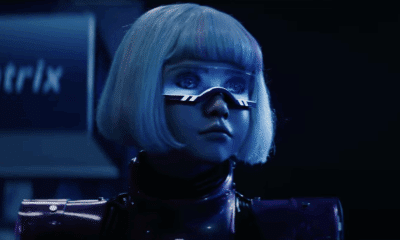

Film Trailers
/ 17 hours agoGenre sequel ‘M3GAN 2.0’ – final trailer lands
A final trailer for M3GAN 2.0 has landed ahead of its release at the...
By Paul Heath -


Film Trailers
/ 17 hours agoFirst teaser trailer for ‘Downton Abbey: The Grand Finale’
A teaser trailer for the latest instalment in the Downton Abbey series has arrived...
By Paul Heath -


Home Entertainment
/ 1 day ago‘Piglet’ review: Dir. Andrea M. Catinella (2025)
Before settling in to watch Andrea M. Catinella’s Piglet, it is important to point...
By Kat Hughes -


Film Trailers
/ 1 day ago‘Black Phone 2’ trailer; horror sequel lines up October release
A new trailer for Black Phone 2 has landed online from Universal Pictures. The...
By Paul Heath
